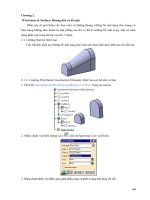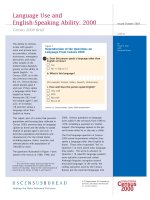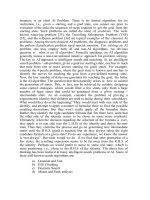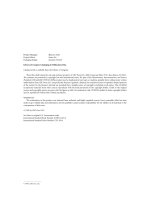Tài liệu Professional Ethics and Etiquette THIRD EDITION ppt
Bạn đang xem bản rút gọn của tài liệu. Xem và tải ngay bản đầy đủ của tài liệu tại đây (11.71 MB, 179 trang )
Career Skills Library
Professional Ethics
and Etiquette
THIRD EDITION
FERGUSON
CAREER SKILLS LIBRARY
Career Skills Library
Communication Skills
Finding A Job
Leadership Skills
Learning the Ropes
Organization Skills
Problem Solving
Professional Ethics and Etiquette
Research and Information Management
Teamwork Skills
Professional
Ethics and
Etiquette
THIRd EdITION
FERGUSON
CAREER SKILLS LIBRARY
Career Skills Library: Professional Ethics and Etiquette,
Third Edition
Copyright ©1998, 2004, 2009 by Infobase Publishing
All rights reserved. No part of this book may be reproduced or utilized
in any form or by any means, electronic or mechanical, including
photocopying, recording, or by any information storage or retrieval
systems, without permission in writing from the publisher. For information
contact:
Ferguson
An imprint of Infobase Publishing
132 West 31
st
Street
New York, NY 10001
Library of Congress Cataloging-in-Publication Data
Professional ethics and etiquette. — 3rd ed.
p. cm. — (Career skills library)
Includes bibliographical references and index.
ISBN 978-0-8160-7772-4 (hardcover : alk. paper) 1. Business ethics. 2.
Business etiquette. I. Ferguson Publishing.
HF5387.P747 2009
174’.4—dc22 2009003250
Ferguson books are available at special discounts when purchased in bulk
quantities for businesses, associations, institutions, or sales promotions.
Please call our Special Sales Department in New York at (212) 967-8800 or
(800) 322-8755.
You can find Ferguson on the World Wide Web at
Text design by David Strelecky, adapted by Erik Lindstrom
Cover design by Cathy Rincon
First edition by Joe Mackall
Printed in the United States of America
MP FOF 10 9 8 7 6 5 4 3 2 1
This book is printed on acid-free paper.
CONTENTS
Introduction 1
1 Developing Self-Knowledge . . . . . . . . . . . . 5
2 Recognize Your Values and Ethics . . . . . . 25
3 Become More Reliable and
Responsible 47
4 Achieving Professional Excellence . . . . . . 67
5 Be Aggressively Nice . . . . . . . . . . . . . . . . . 87
6 Be a Learner 101
7 Improve Your Time-Management,
Goal-Setting, and Memory Skills . . . . . . 119
8 Maintain Balance to Succeed in the
Workplace 139
Web Sites 151
Glossary 155
Bibliography 159
Index 163
11
INTRODUCTION
F
rom coast to coast, employers search for the
ideal employee. Skills and experience count,
but most businesses are looking for something else,
too: character.
The kind of person you are matters to your
employer. One of the most important things you
can do right now for your career is to develop the
type of character that employers want. How respon-
sible are you? Are you the kind of person others can
count on? Have you developed good habits such as
working hard, striving for excellence, and practicing
professional etiquette? It’s never too early or too late
to develop these qualities.
Great management is about character, not technique.
—Thomas Teal, Harvard Business Review
This book begins with your favorite subject—you.
You’ll unlock the secrets of your temperament, your
learning style, your strengths and weaknesses, and
2 Professional Ethics and Etiquette
your values. Then you’ll take an honest look at what
employers want to see in you when you show up
for work. You’ll get tips on everything from how
to manage your time to improving your memory.
You’ll learn to develop your personal code of ethics
and maintain a professional presence.
In other words, you’re about to discover that your
best secret weapon to a successful career could be
you.
The most important thing for a young man [woman]
is to establish a credit—a reputation, character.
—John D. Rockefeller, American businessman
This book covers the following topics:
Learning about yourself so you can identify
•
which areas of your professional life need
the most improvement
Getting in touch with your personal values
•
and ethics so you know how to react to
various situations
Becoming a responsible person that others
•
can count on
Acting professionally in all situations—
•
from appropriate dress code to after-hours
etiquette
2 Professional Ethics and Etiquette
Right Running Head 3
Making an impact on others by being •
aggressively nice
Asking questions and learning the ropes at
•
a new job
Improving your memory through word
•
association and other techniques
Balancing your work life and avoiding job
•
stress
DID YOU KNOW?
Employers surveyed in 2007 by the National
Association of Colleges and Employers rated
honesty/integrity and a strong work ethic
as “very to extremely important” for job
candidates.
Introduction 3
5
DEVELOPING
SELF-KNOWLEDGE
S
elf-knowledge is definitely “in.” People pay ana-
lysts thousands of dollars to learn more about
themselves. Books on self-image and self-improve-
ment are always among the best-sellers. Several
psychologists have become national radio and tele-
vision celebrities. Most of us spend more time think-
ing, worrying, and dreaming about ourselves than
we spend on all other subjects combined.
Focusing on self-knowledge can be invaluable as
you pursue a career. Although employers look for
specific technical skills and abilities in job candi-
dates, character counts.
A NEW YOU
If you’re just beginning your career, you’re on the
verge of becoming a whole new person. Talk to
people who have recently graduated and started
careers. Most of them will have stories of how
5
1
6 Professional Ethics and Etiquette
much they’ve changed because of their work
environments.
Michele got a first-year teaching job as coach at
a state special-education school. As she talks about
her experiences, she shakes her head, still amazed
at what she learned about herself. “I thought I was
pretty together. But I didn’t have a clue how I’d
react to so much responsibility. Nothing in school
prepared me for being in charge of so much. I
thought I was pretty outgoing, but all I wanted to
do was retreat—hide out.”
Ben discovered new things about himself when
he joined a group of trainees as part of a telecom-
munications company. He admits, “I would have
said I was pretty mature. But three months of train-
ing really threw me. I didn’t think I was an emo-
tional person, but I went up and down, highs and
✔ TRUE OR FALSE?
Do You Know Yourself?
1. Understanding your personality type will help
you ease into a new job.
2. Introverts never have success in the workplace
because they are too quiet.
3. Most of us depend on one side of the brain
more than the other to learn.
Test yourself as you read through this chapter.
The answers appear on pages 20–21.
Right Running Head 7
lows—all over the emotional map. I didn’t know
what was going on.”
Be more concerned with your character than your
reputation, because your character is what you really
are, while your reputation is merely what others think
you are.
—John Wooden, former basketball coach and
member of the Basketball Hall of Fame
Meredith took a job as part of a secretarial pool
in a large investment firm. She started getting
depressed her first week at work. Everybody else
seemed outgoing and excited about the new chal-
lenges. Meredith dreaded every change. Then she
remembered some of the material she’d read on
personality types.
“In one of my classes, we took personality tests.
I came out the type who is reliable, but doesn’t like
new things. So I knew that what may have come
naturally for my coworkers just didn’t for me. But
that was okay. I could do what I needed to socially.
At the same time, I could make myself indispens-
able by using my strengths. I didn’t have to try to
imitate their strengths.”
KNOW YOURSELF
Now is the right time for you to get to know your-
self. Self-knowledge won’t make all the surprises
Developing Self-Knowledge 7
8 Professional Ethics and Etiquette
and stresses of your first year on the job go away,
but you’ll be better prepared for those changes and
better able to understand your own reactions.
If you can learn more about yourself, you can equip
yourself for your career. For example, if you know
that your energy can be “refueled” only when you’re
alone, you know to plan time to be by yourself. If
you’re aware of your laid-back tendencies, you know
to give yourself an occasional go-ahead kick.
Knowing yourself gives you a chance to meet
your own needs. That takes pressure off at work.
Then, if your job doesn’t meet your expectations,
your whole world won’t fall apart.
☛ FACT
Noted psychologist Carl R. Rogers claimed that
self-discovery is the basis of psychological health
and success. After treating thousands of patients,
he concluded that one central issue lies behind
almost every problem—a lack of self-knowledge.
PROFILES AND TYPES
When you say that someone has a great personal-
ity, what do you mean? How about when you refer
to someone who’s “not your type”? Psychologists
generally refer to personality and type by cer-
tain categories. Many of these categories are
Right Running Head 9
based on opposite characteristics: introvert/
extrovert; feeling/thinking; perceiving/judging;
sensing/intuiting.
People seem to be born with tendencies toward
specific temperaments, learning styles, and think-
ing styles. No one style is the right one or even the
preferable one. But if you know your styles and your
temperament, you can use your strengths in work
situations—and can be on guard against your poten-
tial weaknesses.
PERSONALITY
Each personality is completely unique, but many
have common characteristics that can be grouped
together. In the Middle Ages, physicians divided the
temperaments of personalities into four categories:
phlegmatic, sanguine, choleric, and melancholy.
Many variations exist among the categories, and
nobody fits completely into one of the categories.
Yet most of us can easily see ourselves in one or two
of these four divisions.
The following exercise is a personality inventory
to give you clues as you investigate who you are.
The exercise is designed to give you an idea about
personality for entertainment purposes. For more
accurate information, and a much more thorough
inventory, ask your school counselor to give you
the Meyer-Briggs Type Indicator or any of the more
scientific inventories your school recommends.
Developing Self-Knowledge 9
10 Professional Ethics and Etiquette
APPLYING YOUR KNOWLEDGE
OF PERSONALITY
Look over your sheet from the above exercise. Are
there more words under one personality type than
the others? To get another perspective, ask a par-
ent, sibling, or friend to do this inventory accord-
10 Professional Ethics and Etiquette
PERSONALITY ASSESSMENTS
ON THE WEB
The Career Interests Game
/>thecareerinterestsgame.php
The Career Key
Holland Codes Self-Directed Search
Keirsey Temperament Sorter
Myers-Briggs Type Indicator
The Personality Page
PersonalityType.com
Right Running Head 11
Developing Self-Knowledge 11
✍ EXERCISE
Four categories of personality traits are given in
the chart on page 12. Divide a sheet of paper
into four quarters. Mark one quarter with a
P (for phlegmatic) at the top, one with an S
(for sanguine), one with a C (for choleric),
and one with an M (for melancholy). Under
each letter, write the words or phrases from
the corresponding quarters of the chart that
describe you most of the time.
ing to their perception of you. These inventories
are designed to get you thinking about your per-
sonality type. For more detailed analysis, ask your
guidance counselor.
Each of the four temperaments, or personality
types, carries with it a set of strengths and corre-
sponding weaknesses. If you wrote most of your
words and phrases under one category, pay special
attention to the tendencies of that temperament.
Phlegmatic
Life for the phlegmatic-type person tends to go
along smoothly. Her strengths lie in her combina-
tion of abilities and her steady consistency. She
can relax, enjoy friends, and keep the peace. She’s
easy to live with and undemanding. The phleg-
matic may need to be on guard against laziness or a
The phlegmatic
may need to be
on guard against
laziness or a lack
of motivation.
12 Professional Ethics and Etiquette
12 Professional Ethics and Etiquette
Phlegmatic
easygoing
discerning
uninvolved
not bossy
consistent
spectator
stubborn
accurate
detailed
pleasant
submissive
rarely angry
dry humor
kindhearted
indecisive
orderly
calm
adjusts well
reserved
steady
can be lazy
can imitate
others
fearful
predictable
laid-back
factual
timid
sleepy
scheduled
peacemaker
analytical
controlled
Sanguine
laughs a lot
conceited
optimistic
enthusiastic
inspirational
friendly
poor listener
dislikes being alone
likes new things
bubbly
verbal
likes taking risks
spontaneous
fun-loving
popular
lacks follow-
through
outgoing
pleasant
adventurous
initiator
makes others laugh
likes change
gets bored easily
shallow
relationships
angry
smiles a lot
visionary
motivator
energetic
talkative
forgets easily
Choleric
domineering
impudent
logical
active
confident
controlled
poor listener
enterprising
purposeful
hard to discourage
determined
quarrelsome
angry
decisive
inflexible
ambitious
goal-oriented
good planner
problem solver
handles pressure
well
leader
demanding
strong-willed
likes a challenge
impatient
pushy
well organized
self-reliant
opinionated
hot-tempered
practical
independent
competitive
insensitive
stubborn
firm
adventurous
brave
Melancholy
analytical
creative
moody
shy
visionary
pessimistic
gifted
hypochondria
genius tendencies
self-sacrificing
individualistic
intense
suspicious
self-centered
critical
fearful
private
may be depressed
perfectionist
emotional
faithful friend
thinks “too much”
sensitive
vengeful
sad
hurt feelings
artsy
introvert
dependable
slow to initiate
feels guilty
solitary
imaginative
CATEGORIES OF PERSONALITY TRAITS
Right Running Head 13
lack of motivation that keeps her on the sidelines as
a spectator. She can become stubborn, indecisive, and
even fearful.
Melancholy
The melancholic-type person sees things in life
that others miss. He’s sensitive and often gifted. He
doesn’t mind sacrificing himself for others and makes
a faithful friend and a good listener. He is thoughtful
of others. He’s always dependable because his per-
fectionist tendencies make him conscious of letting
people down.
The melancholic may need to work on controlling
his moods, which can vary widely with his emotions.
He needs to stand up for himself and make tough
decisions. He may have to work on meeting new peo-
ple and not worrying what others think about him.
Sanguine
A sanguine temperament is great in a crowd. She
loves new situations and experiences and is seldom
at a loss for words. She’s cheerful, enthusiastic, and
a great motivator, full of energy. The sanguine per-
son may need to improve her organization and
follow-through. She should work on becoming a
better listener and on forming deeper relationships.
Sanguines tend to get bored easily and become rest-
less and undisciplined.
Choleric
The choleric is independent, decisive, and self-suf-
ficient. He has little trouble making decisions and
Developing Self-Knowledge 13
Sanguines tend to
get bored easily
and become
restless and
undisciplined.
14 Professional Ethics and Etiquette
14 Professional Ethics and Etiquette
usually makes a strong leader. He loves activity
and has lots of ideas and the plans to implement
them. He’s determined, practical, and knows his
own mind.
The choleric may be so goal-oriented that he’ll
need to be careful not to overlook other people’s
needs. He can be a tough person to live with,
inflexible, and impatient. He may need to work on
people skills to become a motivator rather than a
dictator.
Workers with a sanguine temperament are generally happy and
energetic. (Helen King, Corbis)
Right Running Head 15
LEARNING STYLES
You’ve probably heard about recent studies on how
our brains function. The brain has two sides, and
each hemisphere functions differently. Most of us
depend more on one side of the brain than the
other as we learn new information. In part, that
explains our different learning styles.
For example, you want to give your little sister a
tricycle for Christmas. Christmas Eve comes, and
it’s time to assemble the pieces. Do you pull out the
instruction book and read through it step-by-step?
Or do you dump everything out on the living room
carpet and start figuring what goes where? What
you do says a lot about your learning style.
Some of us are more “left-brained,” or analytical,
in the way we learn. We need the instruction book
and well-ordered steps. The left side of the brain
handles numbers, words, and details. It’s organized
and sequential. The left brain analyzes parts.
“Right-brained” people see the whole picture.
They remember faces (forget the names), patterns,
and images. Give them a vision of what’s needed,
and let them create spontaneously. They’ll get that
tricycle together eventually. Forget the instruction
book.
Another difference in learning style is whether
we learn more effectively through hearing (audito-
ry), seeing and writing (visual), or touching (kines-
thetic). The auditory learner learns best from word
of mouth. Verbal instruction has the most impact—
hearing someone’s name, listening to instructions.
Developing Self-Knowledge 15
16 Professional Ethics and Etiquette
16 Professional Ethics and Etiquette
The visual learner tends to think in pictures and
remember what she sees or writes. Hearing directions
doesn’t work as well as putting those directions in
writing.
A kinesthetic learner prefers to learn by doing.
Reading or hearing isn’t as effective for him as hands-
on instruction. Touch is important to the learning
process.
APPLYING YOUR KNOWLEDGE
OF LEARNING STYLES
Just think about the way you learn best in class. Does
it help you to write and rewrite dates or words in
order to learn them? Or are you better off saying them
BRAIN HEMISPHERE DOMINANCE
Left-Brain Learner Right-Brain Learner
Sees in parts Sees the whole
Logical Creative
Learns in numbered steps Learns by figuring out
Follows in straight line Sees the pattern
Likes words Likes images
Orderly, organized Spontaneous
Right Running Head 17
aloud? Do you remember more by listening intently
to your teacher (auditory), or by taking notes or read-
ing the information in a book (visual)? Are flash cards
and other hands-on learning activities most helpful
for remembering and learning (kinesthetic)?
Understanding your learning style can help you
make a smoother transition to your new job. Imagine
your first week on the job. How can you learn and
remember names, duties, operations, and proce-
dures? If you’re a visual learner, it may help to carry
a notebook and record new information and names.
Auditory learners can discuss procedures and repeat
names aloud. Kinesthetic learners might practice new
procedures immediately or take notes and make their
own study sheets later. They can look for hands-on
tutorials.
☛ FACT
A new tool to aid visual learners is on the market
—the SMART Board interactive whiteboard. This
is a large white screen designed for classroom
use to project images from a computer. It can
also be used like a blackboard for drawing.
Anything created on the SMART Board screen can
be saved, printed, or emailed. The screen is also
touch-sensitive—teachers can simply press the
surface to write notes, call up charts and images,
control computer applications, and surf the Web.
To learn more, visit the SMART Technologies
Web site ().
Developing Self-Knowledge 17
18 Professional Ethics and Etiquette
18 Professional Ethics and Etiquette
If you’re a left-brain learner, you may want to
organize your own steps for new procedures. If
you’re a right-brain learner, write down names to
go with the faces you remember. Your notes might
include sketches and patterns.
Pay attention to what works for you now in your
classes. This way, you will be ready to make the
most out of your learning style when you start your
career.
INTROVERTS AND EXTROVERTS
You may already feel you know whether you’re an
extrovert or an introvert. In general, extroverts are
outgoing, like the sanguine personality type. They
do well in crowds and enjoy meeting new people.
Extroverts tend to be talkers and doers, looking for
the action, thriving on activity.
Introverts are thought to be quieter, more private
people. They may be shy and more comfortable
with the familiar. They enjoy deep friendships and
the company of a few good friends, but crowds
make them uncomfortable and they retreat.
Still, recent studies have pointed out a significant
difference in the categories. Some people may sim-
ply be good at faking extroversion, even to them-
selves. They feel somehow responsible that others
have a good time and behave as the life of the party
to ensure its success. They have mastered speech
and verbal skills and the art of storytelling. All these
qualities lead them to believe they are extroverts.









